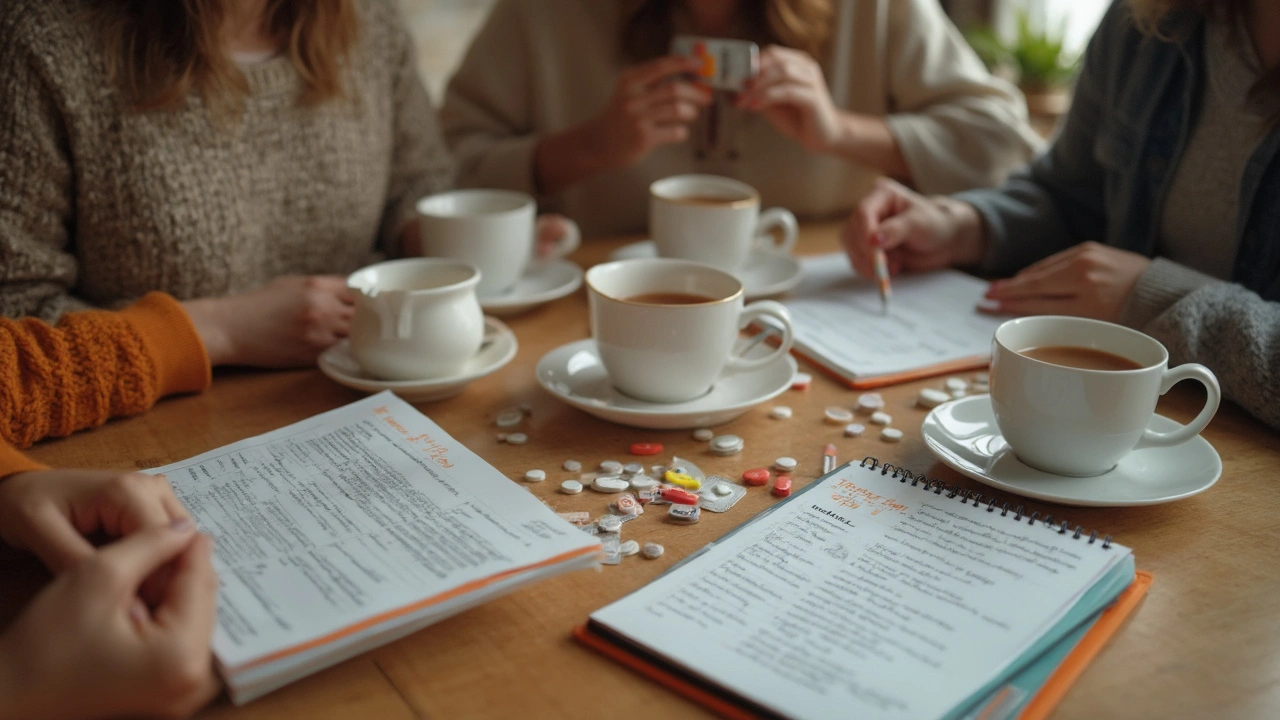Mixing Butylscopolamine with Other Medications: Safe Combinations & Common Pitfalls

Imagine popping a pill for stomach cramps and stacking it with a cold medicine or a blood pressure tablet—most folks don’t think twice. But did you know that butylscopolamine isn’t just another harmless antispasmodic? When it meets other meds in your system, things get interesting. Sometimes risky. Not in the scary, freak-you-out way, but enough to make your pharmacy bill and your heart race if you’re not careful. So the next time you think about mixing pills, here’s your playbook.
What is Butylscopolamine and How Does it Work?
Butylscopolamine (often called hyoscine butylbromide or by the common brand names Buscopan, Scopinal, or others) is one of those medicines that hang around quietly at the back of your bathroom cabinet. It shines when stomach cramps, irritable bowel syndrome (IBS), or bladder spasms rear their ugly heads. This drug works by calming down the smooth muscles in your gut and urinary tract. Instead of fixing what’s causing the pain, it dials down the annoying cramps by blocking something called muscarinic receptors. Think of it like telling an overexcited toddler to take a nap.
Butylscopolamine is part of a class called anticholinergics—fancy speak for drugs that block acetylcholine, a neurotransmitter that basically tells your muscles when to contract. Sure, it feels like it only targets your gut, but these receptors are sprinkled everywhere: saliva glands, eyes, even your bladder. That’s why some people might notice a dry mouth or blurry vision, and why it matters even more when mixing with other meds.
Here's a cool tidbit: butylscopolamine can’t easily cross the blood-brain barrier, so it doesn’t make you drowsy or mess with your brain as much as its cousin, regular hyoscine. That makes it pretty safe, but not risk-free. Even a "gut-only" pill can stir up trouble when you toss other meds into the mix—especially because those muscarinic receptors are multitasking everywhere else in your body.
This medicine isn’t often affected by what you eat, but big doses or mixing with other anticholinergic drugs? That’s where the fun stops and the risk starts. More on that coming up.
What Drugs and Conditions Need Extra Caution?
By now, you might be eyeing your medicine shelf, wondering which of those bottles are brandishing anticholinergic powers. Let’s break it down. The real troublemakers are usually found hiding as cold and allergy meds, antidepressants, antipsychotics, Parkinson’s drugs, and even some heart medications. If you’re already dealing with dry mouth, constipation, or trouble peeing, things get worse. Double up on anticholinergics, and your side effects double too—like a not-so-fun BOGO sale.
Tables make everything easier, so check this out:
| Drug/Category | Interaction Risk | Common Brand Names |
|---|---|---|
| Antihistamines (for allergies/colds) | Increased dry mouth, blurry vision, constipation | Benadryl, Claritin |
| Tricyclic Antidepressants | Severe anticholinergic effects: confusion, high heart rate | Amitriptyline, Imipramine |
| Antipsychotics | High risk of overheating, urinary issues | Haloperidol, Clozapine |
| Antiarrhythmics | Heart rhythm problems, increased toxicity | Disopyramide, Quinidine |
| Parkinson’s Meds | Aggravated confusion, worse constipation | Biperiden, Trihexyphenidyl |
| Opioids | Higher risk of severe constipation or gut blockages | Codeine, Morphine |
Mixing butylscopolamine with alcohol? Not a good idea, honestly—it can boost drowsiness (rare, but it happens), cloud your thinking, or worsen gut slowdowns. Got glaucoma, enlarged prostate, severe heart disease, or myasthenia gravis? You’re in the higher-risk club. If you’re unsure, assume you could be sensitive and ask your doctor or pharmacist to double-check your combination.
Age is no friend here. Seniors, your body processes meds slower, and the list of prescription bottles on your counter gets longer. More meds mean more opportunity for butylscopolamine to step on someone else’s toes. One 2023 UK hospital study found that among adults over 60 who mixed anticholinergic drugs, their risk of ER visits from confusion or falls jumped by 40% compared to others. Not a tiny difference.

How to Safely Combine Butylscopolamine with Other Medications
Think of medicine combinations like building a sandwich. You need the right layers—get creative with your peanut butter and pickles, and the results can be weird. For pills, missteps can mean nasty side effects or your meds not working right. Here’s how to avoid trouble when mixing butylscopolamine with other medications:
- Keep an updated meds list. Write down prescriptions, over-the-counter pills, vitamins, even herbal supplements. When you see your doctor or pharmacist, hand it over and ask if anything’s likely to clash with butylscopolamine.
- Spot duplicate anticholinergics. If you’re on a cold syrup and also a bladder-control medicine, you could be doubling up on side effects like dry mouth, trouble peeing, or overheating. Find those hidden overlaps early.
- Start small, move slow. If a new medicine is needed, ease in with the lowest dose and ramp up only if your body adjusts without weird side effects. Give each change a week or so to settle in (unless your doctor says otherwise).
- Know your own warning signs. Feeling dizzy, confused, overheated, unable to pee, or freaked out by crazy dry mouth? Stop, reassess, and call your doctor. If your heart is racing or vision goes really blurry, skip the wait—get help now.
- Don’t trust memory—check every time. Drug names and combos change, and sometimes the same drug is sold under different brand names. Run your list through a pharmacist whenever anything changes, or at least every time you pick up a refill.
- Hydrate and move. Butylscopolamine and its cocktail partners love to clog you up. Drink water. Stay active. Get ahead of constipation before it becomes a major problem.
This isn’t a game for guesswork, so ask every time. My wife, Faith, is legendary for double-checking her migraine meds—after a mix-up years ago gave her a scary fast heartbeat for half an hour. Lesson learned: a quick pharmacist chat can save you a wild ride.
Another trick: use the same pharmacy for all your scripts. That way, their computer system shouts a digital warning if something dangerous shows up in your medication list. It’s not perfect, but it’s a helpful extra set of eyes.
Side Effects, Signs of Trouble, and When to Get Help
You might get away with a minor headache, but the wrong combo can mess up your day, week, or even send you looking for urgent care. Not trying to scare you—just being honest. Here’s what shows up most when butylscopolamine gets mixed with the wrong med:
- Sudden confusion or memory hiccups, especially in older adults
- Serious constipation, sometimes leading to bowel blockages
- Pounding heart or racing pulse
- Trouble urinating or feeling like you always have to go
- Blurry vision that doesn’t quit after a dose
- Fever, heat intolerance, or sweating less than usual
- Dry mouth so bad you feel you’re chewing on cotton balls
If these show up, don’t try to tough it out. Call your healthcare provider or, if things are severe (unbearable pain, confusion, won’t pee, projectile vomiting)—get help pronto. Most of the time, stopping one of the anticholinergic meds or tweaking doses fixes the problem quickly.
If you’re mixing butylscopolamine with opioids or strong painkillers, your gut can slow to a crawl—a weird, hard stomach and almost no poop in days isn’t normal. This is called paralytic ileus and is worth a trip to the doctor. Kids, older adults, and those with shaky immune systems are especially at risk.
Keep an eye out for drug-allergy crossover, too. A rare few will react with hives or trouble breathing after a combo. EpiPen or ER time, no question. If you’re worried, try to get a medical alert bracelet or keep your meds list on your phone; that helps first responders if things go sideways.
The reality is, most combos go fine as long as you respect the power of quiet old butylscopolamine. Stay curious, ask the obvious questions, never be embarrassed to call your pharmacist. This isn’t about paranoia—it’s about smart, safe use so your cramping gut gets relief without any drama from the rest of your body.
Bottom line—staying safe while combining butylscopolamine with other meds is all about planning, communication, and trusting your gut (pun absolutely intended). The right moves make for smooth, pain-free days; the wrong ones, well—they make for stories you don’t want to tell. Stay alert, ask questions, and your belly (and brain) will thank you.